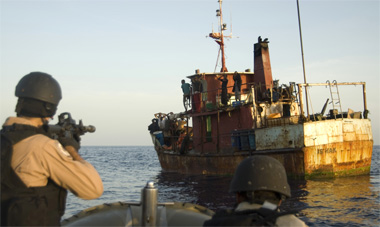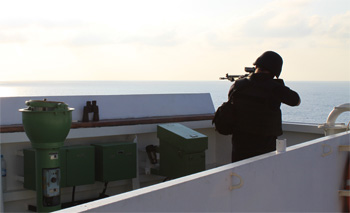In protecting merchant ships from pirates, private armed guards have become a favorite tool. The guards and their weapons, however, present legal risks for the shipowner and master if something goes wrong.
The liability exposure and desire to defend ships safely have led to various efforts to establish professional standards and best practices for the deployment of the gun-toting guards. An international certification program has been created to vet the security providers.
While several types of deterrents are on the market, many shipowners who sail through the Gulf of Aden and Indian Ocean pirate zones are choosing private security contractors with firearms to keep an eye out for pirate boats and use gunfire when needed. Since the deployments became commonplace over the past five years, no merchant ship with armed guards aboard has been captured by pirates.
Ship masters on U.S.-flag vessels generally want armed guards as part of an overall vessel security plan, said Klaus Luhta, chief of staff of the International Organization of Masters, Mates & Pilots. Those privately hired guards, however, do not enjoy the same legal immunity as members of the military. Ship officers and owners need to be assured that the guards are highly qualified and will behave properly within the chain of command.
“We know that it works. The efficacy is there, but there’s a tendency to be a little bit complacent with the armed guards. You’re sending these guys out to sea, and they have free reign, and it’s the Wild West out there,” Luhta said. “The whole standardization process is gaining some momentum.”
 |
|
Courtesy U.S. Navy |
|
A private armed guard protecting a ship from pirates does not enjoy the same legal immunity guaranteed to military personnel, including this joint U.S. Navy and Coast Guard patrol that boarded a suspected pirate vessel in the Gulf of Aden, below. |
Even before the rise of the Somali piracy threat in 2008-09, U.S. merchant ships enjoyed a long-standing legal right to carry firearms and to use force if the vessel or crew are under threat, said Douglas Burnett, a maritime attorney in New York. For centuries, it was commonplace for merchant ships to carry canons and small arms, and civilian seafarers were trained to use them, he noted.
“For merchant ships and sailors, there certainly is an inherent right to self-defense,” Burnett said. “It should be part of the vessel security plan, and it is always the last resort.”
The deadly 2009 hostage incident aboard Maersk Alabama demonstrated the limitations of the ship’s non-lethal anti-piracy tactics, which involved lookouts, a fortified secure room and the firing of flares. The pirates’ successful boarding — and the subsequent actions of Capt. Richard Phillips — were dramatized in last year’s movie “Captain Phillips.”
“He did alright, but it would have been a lot better if he had weapons,” Burnett said. “Warning shots would probably have deterred them, and right after that was when the U.S. Coast Guard changed its policy on armed guards.”
Nowadays, U.S.-flag ships typically will contract with an American security company to carry two pairs of trained armed guards, on alternating watches. They are accountable to their employer ashore, but technically while aboard they answer to the ship’s master, said John A.C. Cartner, a Washington, D.C.-based maritime lawyer who is co-author of the book “The International Law of the Shipmaster” and a former master aboard tanker ships.
“There is a very delicate balance between the armed guards and the master,” Cartner said. “The master has complete control over the armed guards. He’s the one who decides when to fire and when not to fire and when to end the engagement. Some people think that’s up to the tactical officer, but that’s not true.”
As a practical matter, though, the master won’t always be on watch when the hijackers show up. Armed guards sometimes must react independently based on a previously agreed-to understanding with the captain as to what is appropriate under various scenarios.
“Unfortunately, with armed guards, it’s a strange area,” Luhta said. “The captain is ultimately responsible, but it can be complicated, because the captain doesn’t always have the intell. … At 3 o’clock in the morning, with a sleepy-eyed captain, it’s hard to make that judgment call.”
“It’s within the rights of the captain to establish those types of standing orders, and it’s done all the time. It’s the responsibility of the captain to establish a relationship with the armed guards.”
There is always a possibility that armed guards will wound someone who turns out not to be a pirate — or are overzealous in their use of deadly force. While the shipowner and master are usually covered for liability under the vessel’s P&I insurance coverage, they may still be named in a lawsuit if something goes wrong. Cartner said a plaintiff lawyer will probably sue the vessel, owner, security company and shooter, while also urging authorities to file criminal charges.
An armed guard should use the minimal amount of force to convince the attacker to go away.
“You can’t just shoot the pirates,” Burnett said. “Usually first you fire warning shots. Then the next thing they try is disabling fire (at their boat). Then you can actually shoot at them, but once the threat is gone you have to stop.”
In a potential legal dispute later, “you look at whether the shooting was justified and whether it was proportional to the threat,” he said.
In a 2009 Port Security Advisory, the U.S. Coast Guard provided four pages of guidance to U.S.-flag commercial vessels. The document guarantees the crews’ rights to use deadly force in self-defense, but is careful to set limits.
“Defense of the vessel alone does not justify deadly force,” the document states. “Unless otherwise directed by the master, the crew and security personnel may use non-deadly force in defense of the vessel. Masters should consider all the circumstances when employing force, and resort to deadly force only when there is imminent danger of death or great bodily harm.”
Not only does the U.S. government recognize the right of ships to defend themselves, armed guards may be a requirement for U.S.-flag voyages through pirate zones.
“That’s because the U.S. cannot afford to have Americans taken hostage,” Burnett said. “You are required to submit your vessel security plan to the Coast Guard for review, and that plan will probably not be approved unless you have at least four armed guards and they have to be ex-military or law enforcement.”
Another risk for the master, crew and the armed guards themselves is criminalization — in particular an accusation that the ship is gun-running. Weapons-possession laws vary widely from port state to port state. Last year, AdvanFort International Inc.’s anti-piracy patrol ship Seaman Guard Ohio was detained in India. Its captain, crew and guard teams were jailed for months. Among the charges was bringing weapons into Indian territorial waters unlawfully. Virginia-based AdvanFort denied the accusation.
“On U.S. ships, the guns usually have to be locked up while in port or disassembled,” Burnett said. “You want to show, if the customs people come on board, that the guns are all locked up and only the captain has the key. You want to say that the weapons are part of the ship’s equipment and you’re taking precautions to avoid the possibility of theft.”
A major challenge for shipowners has been assessing which security providers are qualified and reputable. Cartner said all sorts of fly-by-night startups have set up shop along the Horn of Africa, offering “highly trained” maritime security guards, but in reality they have gathered a ragtag of castoffs from the Congolese army or elsewhere who lack qualifications and for whom background checks are laughable. The level of training and discipline varies widely.
“This is not a savory business,” Cartner said.
One early effort to establish professional standards is Bimco’s Guardcon program, which offers a 23-page model “Contract for the Employment of Security Guards on Vessels,” and recommendations on the use of force.
A certification program is now available. The three-year-old Security Association for the Maritime Industry (SAMI) has established a Private Maritime Security Companies certification. The program assesses the armed-guard firms based on standards of “experience, competence and reliability.”
Among the SAMI-accredited providers in North America are Marine Security International, Meridian Global Consulting and Trident Group — all based in the U.S. — Canada’s Tundra MDS and British Virgin Islands-based Universal Maritime Solutions.
“The standards have undoubtedly improved the overall level of professionalism and competence within the industry, and (they have) also brought maritime closer in line with the requirements of shipping,” said Steven Jones, SAMI’s maritime director.
Jones said shipowners are seeking the certified providers “especially in order to comply with flag-state demands. However, there is still work to be done to ensure the client base is educated as to their own requirements and that they know they can rely on the maritime security market to provide the protection and deterrent (they need).”
SAMI, based in London, openly publishes the list of certified members on its website. It plans to add an enhanced directory that “will be the tool for accessing information about maritime security providers” including flag-state licenses, International Organization for Standardization (ISO) qualifications and specialty expertise, Jones said.
“This, we believe, will make it easier for shipowners to find the private maritime security companies they need,” Jones said.
Normally the most cautious shipowners seek firms that hire former American or British soldiers, but not all of them are necessarily trustworthy even if they have been vetted. In February, two ex-Navy SEALs working for Trident Group aboard Maersk Alabama were found dead in their cabin. The autopsy revealed that they suffered heart attacks. Seychelles police said there was evidence of heroin use.
The attorneys say masters should be proactive in getting to know their armed guards. If the crew senses a lack of professionalism or a disruptive streak, they should complain.
“If the captain feels that these people are not good, he should make that known to the owner,” Burnett said. “The captain is always on the tightrope.”
The next step in establishing reliability standards is the ISO/PAS 28007 process, which builds upon the SAMI effort and is backed by maritime insurers. The program measures variables such as level of training, reliability and post-incident management. Audits under a pilot program began in 2013.
The whole system will provide financial incentives for shipowners to hire reputable armed-guard teams. “You can save on your insurance premiums, and you can avoid potential claims from your customers for lost cargo,” Burnett said.
Luhta said the relationship between the master and private guards may become more codified in the future.
“There is a push toward eventually seeing armed guards classified as seafarers,” Luhta said. “That would change the dynamic in a positive way. They would sign on to the articles of the ship and would directly answer to the master of the vessel.”
Private armed guards are deployed on an estimated 30 percent of commercial voyages through pirate waters.
“You see shipowners that don’t hire armed guards or they hire the cheapest armed guards, and that’s where shipowners need to be a little careful,” Burnett said. “You have to show that you’re doing your due diligence, and that’s where the certification can’t hurt. If you’re sailing your ship through pirate waters, that’s a foreseeable peril. If the ship doesn’t have armed guards, (a plaintiff) might say you allowed an unseaworthy ship through a foreseeable peril.”

